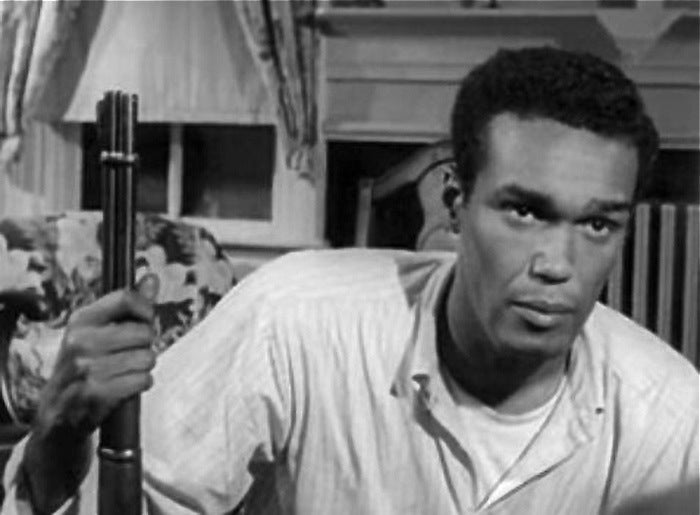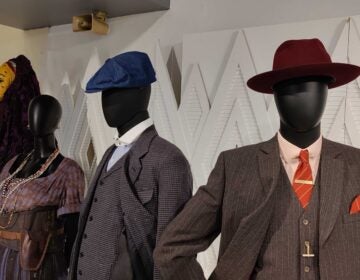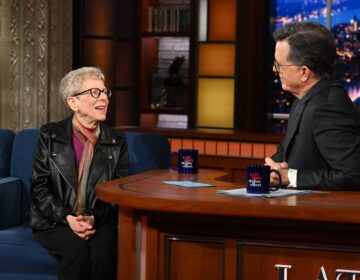Documentary tracks ‘secret history’ of black representation in horror movies
A Philadelphia production team released an online documentary on Shudder, tracking a century of black representation in the bloodiest of genres.

Duane Jones in the 1968 film "Night of the Living Dead." (George A. Romero via Wikimedia Commons)
A new, feature-length documentary will be released online Thursday about the history of African-Americans in horror movies. After limited screenings in New York and Los Angeles, it will debut on Shudder, a popular online horror streaming service.
“Horror Noire,” based on the 2011 scholarly book of the same name, traces the highs and lows of black actors and directors toiling in the most bloody of movie genres.
The movie got its start in 2017 when Phil Nobile saw the movie “Get Out.” At the time he was a video producer (he has since taken the job of editor at the fan magazine Fangoria). The movie about a black man trapped in a hellish white suburb was one of the most talked-about movies of that year.
“When I walked out of ‘Get Out,’ I got to talk to Ashlee about this movie,” he recalled. “I think this is some kind of flashpoint.”
Nobile is referring to Ashlee Blackwell, who for the last five years has been writing Graveyard Shift Sisters, a blog about black women who make horror movies. Both of them are based in Philadelphia and fans of horror.
“People like us who are people of color, we’re always looking at films differently,” said Blackwell. “Number one, representation; and number two, as someone who experiences racism, are there hidden messages other people might not even notice?”
Nobile and Blackwell started shopping around a documentary pitch about a secret history of Hollywood, populated by black actors who signed on to be in movies knowing full well their characters are inevitably the first to die. It also looks at directors who either traded on or kicked against black stereotypes to make groundbreaking horror movies, like “Blackula” and “Sugar Hill” in the 70s, and “Candyman” in the 90s.
They went to every studio, cable channel and streaming service where they could get a meeting. No one wanted it.
“We couldn’t get anyone to buy into this. We couldn’t get anyone to believe this is a project anyone would want to watch,” said Nobile. “Two weeks after Jordan Peele won the Oscar for ‘Get Out’, Shudder called me and said, ‘Let’s do this project and let’s do it now.’”
Philadelphia’s hardcore fans of horror got an advanced look at “Horror Noire” on Tuesday night when it was screened by Exhume Films at the Lightbox Film Center in West Philadelphia. It’s a look back a century of films, starting with the troubling representation of African-Americans in Birth of a Nation, and celebrating the unexpected black hero of 1968’s “Night of the Living Dead.” It bemoaning the low-budget disaster of “Blackenstein” in 1973, the same year as the Bill Gunn film “Ganja and Hess,” which could be described as art-horror.
Many are a cocktail of both exploitation and liberation — sometimes a delicious elixir, sometimes tasteless.
The movie is bookended by “Get Out” and Jordan Peele, who opens the film and is its denouement. “Get Out” was made after the book Horror Noire was published, but it perfectly fits its thesis.
“It’s a film that directly addresses race and a mythical a way of presenting it, but in a way that is palatable,” said Blackwell. “Especially to black audiences who experience fear through racial tension.”
Peele, for his part, has doubled down on horror. The man who got his start as a comedian in the TV duo “Key and Peele” is about to become the host of the CBS reboot of “The Twilight Zone.” His second film, the horror movie “Us,” will be released next month.
WHYY is your source for fact-based, in-depth journalism and information. As a nonprofit organization, we rely on financial support from readers like you. Please give today.





